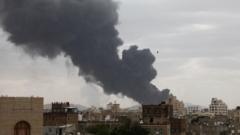The ongoing Israeli military actions in the West Bank have drawn criticism, highlighting socio-political ramifications and humanitarian concerns.
Israel Targets Hamas Command Structure in West Bank Raids

Israel Targets Hamas Command Structure in West Bank Raids
Israeli military expands operations in Jenin, resulting in rising tensions and displacement of Palestinians.
The Israeli military reported on Tuesday the killing of Aysar al-Saadi, a local Hamas commander, during a raid in Jenin, a hotspot for militant activity in the occupied West Bank. The operation was part of a broader initiative aimed at curbing militant insurgency and comes amid an escalation of violence following the Hamas-led attacks on Israel on October 7, 2023.
Israeli forces claim to have initiated these raids to enhance security and combat terrorism, particularly focusing on localized factions within Hamas. The military characterized al-Saadi as a significant figure in the Izz al-Din al-Qassam Brigades, the armed wing of Hamas. His death represents a continuation of the Israeli strategy of targeting leadership within militant organizations, although previous similar efforts yielded only temporary disruptions in militant operations.
In recent months, the Israeli offensive has displaced tens of thousands of Palestinians, according to United Nations reports, which describe this as the largest wave of displacement in decades. The Israeli military insists that mass displacement was unintentional, yet Israeli Defense Minister Israel Katz indicated a strategy of maintaining a military presence in captured areas for extended periods, further complicating the situation for local civilians.
The Palestinian Authority, which holds limited governing authority in the West Bank, has attempted to respond to Israeli actions, though their efforts are perceived to have limited effectiveness. Palestinian residents report a growing sense of insecurity and resentment towards both Israeli actions and the inaction or ineffectiveness of the Palestinian Authority, intensifying the already difficult living conditions in the region.
As the violence escalates, ordinary Palestinians bear the brunt of the conflict, with over 800 fatalities—including civilian casualties—recorded since October 2023. The strained atmosphere poses significant challenges for any potential reconciliation efforts or peace negotiations, as populations increasingly grapple with the realities of ongoing military operations, political fragmentation, and humanitarian crises.
The evolving dynamics of the conflict mark an ongoing challenge for stability in the region, and the consequences of military strategies employed by state and non-state actors alike continue to vilify civilian experiences in what many consider to be one of the deadliest periods in recent West Bank history.
Israeli forces claim to have initiated these raids to enhance security and combat terrorism, particularly focusing on localized factions within Hamas. The military characterized al-Saadi as a significant figure in the Izz al-Din al-Qassam Brigades, the armed wing of Hamas. His death represents a continuation of the Israeli strategy of targeting leadership within militant organizations, although previous similar efforts yielded only temporary disruptions in militant operations.
In recent months, the Israeli offensive has displaced tens of thousands of Palestinians, according to United Nations reports, which describe this as the largest wave of displacement in decades. The Israeli military insists that mass displacement was unintentional, yet Israeli Defense Minister Israel Katz indicated a strategy of maintaining a military presence in captured areas for extended periods, further complicating the situation for local civilians.
The Palestinian Authority, which holds limited governing authority in the West Bank, has attempted to respond to Israeli actions, though their efforts are perceived to have limited effectiveness. Palestinian residents report a growing sense of insecurity and resentment towards both Israeli actions and the inaction or ineffectiveness of the Palestinian Authority, intensifying the already difficult living conditions in the region.
As the violence escalates, ordinary Palestinians bear the brunt of the conflict, with over 800 fatalities—including civilian casualties—recorded since October 2023. The strained atmosphere poses significant challenges for any potential reconciliation efforts or peace negotiations, as populations increasingly grapple with the realities of ongoing military operations, political fragmentation, and humanitarian crises.
The evolving dynamics of the conflict mark an ongoing challenge for stability in the region, and the consequences of military strategies employed by state and non-state actors alike continue to vilify civilian experiences in what many consider to be one of the deadliest periods in recent West Bank history.




















